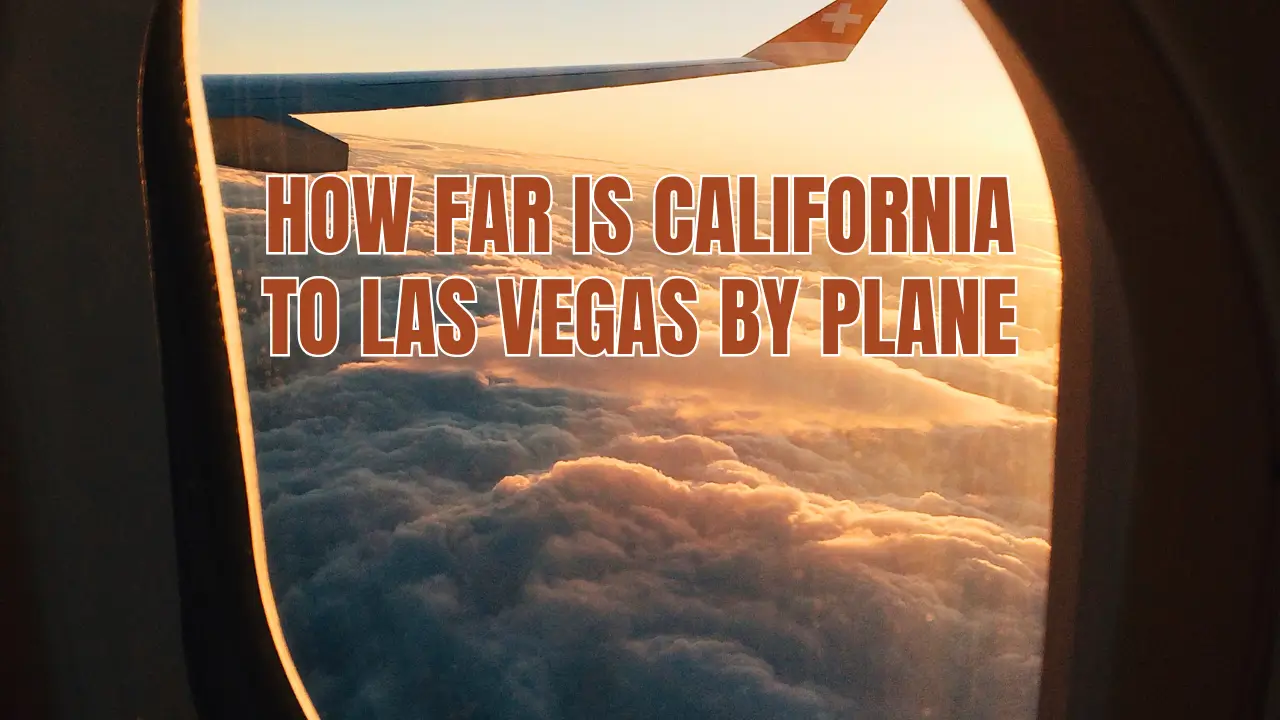Las Vegas is one of those glittering cities that sits at the top of most travelers’ bucket lists. But if you’re in California, chances are you’ve thought about hopping on a plane to Sin City at some point. The burning question? How far is California to Las Vegas by plane? Whether you’re jetting off for a spontaneous weekend getaway or planning a business trip, knowing the flight distance, time, and what to expect can make all the difference in planning your trip efficiently. Let’s break it all down, one flight at a time.
Introduction
Why This Route Is So Popular
The California-to-Las Vegas route is one of the busiest air travel corridors in the United States. Why? It’s simple—entertainment, business, and convenience. Californians frequently fly to Las Vegas for concerts, festivals, conventions, or just to let loose for a weekend. The flight is quick, tickets are usually affordable, and there are multiple flights available each day from various cities across the state.
This route is not just for party-goers. Business travelers take this route often for expos, trade shows, and corporate events hosted at major venues like the Las Vegas Convention Center or the Sands Expo.
Plus, Vegas serves as a jumping-off point for adventures in the Grand Canyon, Zion National Park, and other desert gems. Whether you’re leaving from Los Angeles, San Francisco, or even smaller airports like Burbank or Oakland, flying to Las Vegas is easy, fast, and often quite scenic.
Key Reasons to Know the Flight Distance
Understanding the flight distance helps with:
- Time Management: Knowing whether it’s a quick 45-minute hop or a longer flight from Northern California can help you plan the rest of your day.
- Budgeting: Shorter flights often mean cheaper tickets, but not always. Knowing distance helps you understand airfare pricing.
- Comfort: Shorter flights may not offer inflight entertainment or food. This can be a dealbreaker for some.
- Comparing Alternatives: If you’re considering driving or taking a bus/train, understanding the flight distance puts things in perspective.
Knowing the basics of how far and how fast you can get from California to Vegas will help you make smarter travel choices every time.
General Distance Between California and Las Vegas
As-the-Crow-Flies Distance Overview
The average direct air distance from central California to Las Vegas is about 257 miles (414 kilometers). But keep in mind—California is a massive state. So, the actual flight distance depends entirely on where you’re departing from.
- From Los Angeles (LAX) to Las Vegas (LAS): Approx. 236 miles (380 km)
- From San Francisco (SFO) to Las Vegas: Approx. 414 miles (666 km)
- From San Diego to Las Vegas: Around 270 miles (435 km)
- From Sacramento: Close to 397 miles (638 km)
This “as-the-crow-flies” measure is the most efficient route a plane can take without accounting for air traffic, weather rerouting, or other complications.
Driving Distance vs Flying Distance
If you’re the type to question whether flying is worth it, here’s some food for thought. Let’s compare flying with driving from Los Angeles to Las Vegas:
- Driving distance: 270 miles (takes about 4.5 to 5 hours depending on traffic)
- Flight distance: 236 miles (actual flying time about 43–50 minutes)
Driving takes longer, especially during weekends or holidays when I-15 turns into a parking lot. On the other hand, flying gets you there in under an hour (in the air), even if you spend another hour or so dealing with airport logistics.
Summary: Flying is ideal for saving time, especially for quick turnarounds or business trips.
Major California Cities to Las Vegas Flight Distances
Los Angeles to Las Vegas
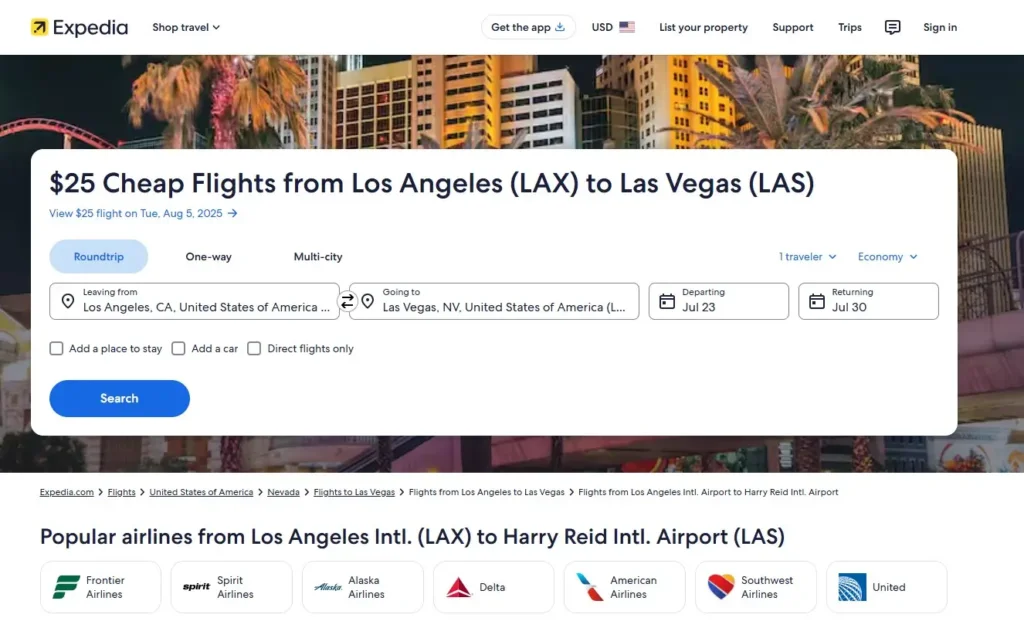
Image Credit: Expedia
This is by far the most popular flight route in California heading into Las Vegas. With more than 50+ flights daily, this route is a favorite among budget airlines and business flyers alike.
- Distance: ~236 miles (~380 km)
- Flight time: Around 43 to 50 minutes (nonstop)
- Airlines: Southwest, Spirit, Delta, American, United
What makes this route extra appealing? The price. Flights often start as low as $29 one-way on budget carriers if you book in advance. Plus, flights are available virtually every hour.
Most flights depart from LAX, but you can also catch nonstop flights from Burbank, Long Beach, and even Orange County. That means you’re never too far from Vegas if you’re in Southern California.
San Francisco to Las Vegas

Image Credit: Expedia
This route is longer and slightly pricier but still offers a quick escape to Vegas.
- Distance: ~414 miles (~666 km)
- Flight time: 1 hour 20 minutes to 1 hour 35 minutes
- Airlines: Alaska, Southwest, United, Frontier
Flights depart from SFO, OAK, and SJC, giving you flexibility depending on where you live in the Bay Area. Flights may cost a bit more—around $60–$150 on average—but if you book early, deals are possible.
This flight covers more air miles and takes longer, so expect more time in the air and possibly more amenities like inflight drinks or snacks depending on the airline.
San Diego to Las Vegas

Image Credit: Expedia
San Diego flyers enjoy the convenience of a quick and painless hop to Vegas.
- Distance: ~270 miles (~435 km)
- Flight time: About 1 hour
- Airlines: Spirit, Southwest, Alaska
The route is popular for weekend getaways. Flights range from $40–$120, and many operate early morning or evening, making it easy to maximize your time in Vegas.
Sacramento to Las Vegas
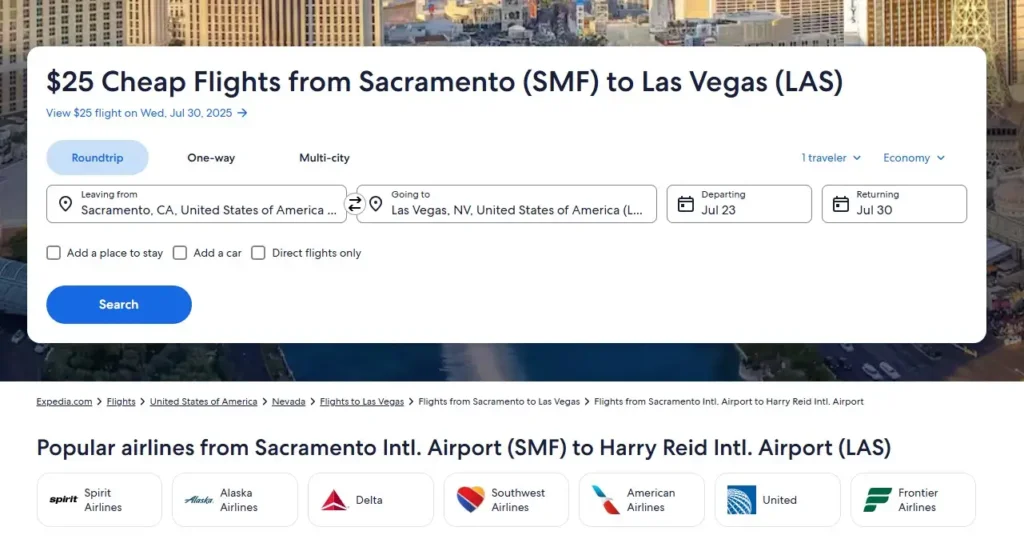
Image Credit: Expedia
Sacramento to Vegas is a solid mid-range route.
- Distance: ~397 miles (~638 km)
- Flight time: Around 1 hour 15 minutes
- Airlines: Spirit, Southwest, Delta
Though slightly longer than SoCal flights, this route is still fast and efficient. If you’re in Northern California, this is one of the best options to reach Las Vegas quickly.
Average Flight Time Breakdown
Nonstop Flights Duration
Nonstop flights from California to Las Vegas are incredibly convenient and surprisingly quick. Depending on where in California you’re flying from, the average in-air time ranges between 43 minutes to 1 hour and 35 minutes. Here’s a quick breakdown:
- LAX to LAS: Around 43–50 minutes
- SFO to LAS: 1 hour 25 minutes
- SAN to LAS: Around 60 minutes
- SAC to LAS: About 1 hour 15 minutes
These durations reflect just the time in the air, which means wheels up to wheels down. Nonstop flights eliminate the hassle of layovers, saving you both time and stress. And because the flight is so short, many airlines don’t bother with full-service amenities—some won’t even offer drinks unless you’re flying a premium airline.
What makes nonstop flights even better is frequency. On major routes like LAX to LAS, you’ll find departures practically every hour. That’s great for flexibility, especially if you miss one—another will be right behind it.
Gate-to-Gate Time Explained
“Gate-to-gate” refers to the total time from when the aircraft pushes back from the gate at your departure airport to when it pulls up at the gate in Las Vegas. This includes:
- Taxi time on the runway
- Takeoff and climb
- Cruise time
- Descent and landing
- Taxi to the gate
While the in-air time might be under an hour, your gate-to-gate duration is more likely around 1 hour 10 to 1 hour 30 minutes, depending on airport traffic, runway conditions, and congestion at your destination.
Pro Tip: If you’re planning a tight schedule (like catching a show in Vegas right after you land), it’s the gate-to-gate time—not just in-air time—you should use when planning.
How Weather and Airport Traffic Affect Flight Time
Flying may seem like a precise science, but weather conditions and air traffic play a huge role in your travel timeline. Here’s how:
- Fog in San Francisco or coastal areas: Delays takeoff
- Heavy traffic at LAS or LAX: Can increase taxi and holding patterns
- Thunderstorms in the desert: May cause rerouting or holding mid-air
Most delays don’t add more than 15–30 minutes, but during peak holidays (like Memorial Day weekend or New Year’s), delays of up to 1 hour aren’t uncommon. Always plan buffer time—especially if you’re heading straight to an event or meeting in Vegas.
Airlines That Operate This Route
Budget Airlines
Budget travelers, rejoice! California to Vegas is one of the best routes to score a killer flight deal. The following low-cost carriers operate frequent and reliable service:
- Southwest Airlines: Offers free bags, tons of flights daily from multiple CA cities
- Spirit Airlines: Ultra-low fares but charges for everything (seat, bag, drink)
- Frontier Airlines: Similar model to Spirit; bring your own snacks
- Allegiant Air: Offers select flights from regional airports like Fresno or Stockton
These airlines often price their tickets as low as $29 to $49 one-way, especially if you book in advance. Just beware of the add-ons—what looks like a cheap ticket can quickly balloon if you’re not careful.
Premium Airline Options
If you’re looking for more legroom, better customer service, or frequent flyer perks, several full-service airlines fly this route as well:
- Delta Airlines
- United Airlines
- Alaska Airlines
- American Airlines
These carriers might cost more up front—usually between $90 to $200+ round trip—but offer benefits like:
- Seat selection
- Complimentary beverages/snacks
- More reliable customer service
- Reward points or miles
For business travelers or those valuing comfort, the extra cost is often worth it. You’ll also get access to business lounges and priority boarding if you’re a frequent flyer member or traveling first class.
Best Time to Fly from California to Las Vegas
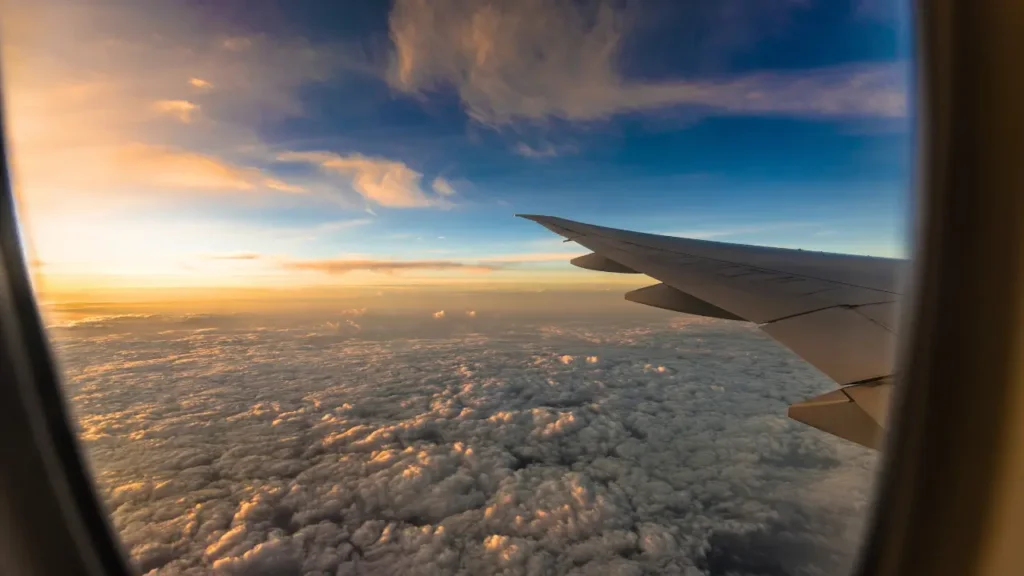
Image Credit: Canva
Weekday vs Weekend Flights
If you’re on a budget or just hate airport crowds, pay close attention to what day you fly.
- Weekends (Friday to Sunday): Most expensive and busiest; prices surge due to weekend getaways.
- Weekdays (Tuesday and Wednesday): Cheapest and least crowded.
- Monday mornings: Busy with business travelers; prices slightly higher.
For the cheapest rates and fastest boarding times, plan your trip between Tuesday morning and Thursday afternoon. Not only will your ticket likely be cheaper, but you’ll avoid long security lines and flight delays too.
Seasonal Trends and Prices
Like most travel destinations, Las Vegas sees seasonal peaks. Here’s a quick guide:
- Spring (March–May): Mild weather, popular for events and conventions
- Summer (June–August): Super hot, but flights are cheap due to the heat
- Fall (September–November): Pleasant weather, higher prices
- Winter (December–February): Popular for NYE; prices skyrocket
If you’re trying to save money, fly in August or early December, when demand dips. If you’re more concerned with the experience, aim for late March or October, when the weather is perfect, and the Strip is alive with entertainment.
Airport Details
Departure Airports in California
You have options. Lots of them. California is home to some of the busiest and best-connected airports in the U.S. Here are some of the main hubs with direct flights to Las Vegas:
- LAX (Los Angeles) – Best for SoCal flyers
- SFO (San Francisco) – Northern California’s main airport
- SAN (San Diego) – Coastal convenience
- SJC (San Jose) – Alternative to SFO for Bay Area residents
- OAK (Oakland) – Budget-friendly and quick access
- BUR (Burbank) – A smaller, hassle-free alternative to LAX
- SMF (Sacramento) – Ideal for Northern Central Californians
Smaller regional airports like Palm Springs, Fresno, and Santa Barbara also offer limited direct flights to LAS, depending on the airline.
Arrival Airport: Harry Reid International (LAS)
Las Vegas is served by Harry Reid International Airport (LAS)—formerly McCarran International. It’s located just 5 miles south of the Las Vegas Strip, making it incredibly convenient for travelers.
Key Features:
- Two terminals (Terminal 1 and Terminal 3)
- Rideshare & shuttle zones for easy pickups
- Slot machines inside the terminal (because, Vegas)
- Quick access to major hotels via taxis or rental cars
Once you land, you’re 10-15 minutes away from your hotel if you’re staying on the Strip. The airport is modern, efficient, and well-marked, which makes arrivals and departures relatively smooth—unless you’re flying out during peak Sunday hours (expect long lines).
Flight Costs and Booking Tips
Cheapest Days to Fly
Let’s get real—who doesn’t love a deal, especially on flights? Thankfully, flying from California to Las Vegas can be surprisingly affordable if you play your cards right.
Generally, the cheapest days to fly are:
- Tuesdays
- Wednesdays
- Saturdays (afternoon or evening)
Avoid flying on:
- Fridays (weekend rush)
- Sundays (everyone’s heading home)
Airfare can fluctuate wildly based on events in Vegas. Got a big boxing match or music festival? Expect prices to spike. Use tools like Google Flights, Hopper, or Skyscanner to track price trends and set alerts.
Here’s a rough breakdown of round-trip ticket pricing from different California cities:
| Departure City | Budget Airline Avg. Fare | Full-Service Avg. Fare |
|---|---|---|
| Los Angeles | $39 – $89 | $120 – $180 |
| San Francisco | $49 – $99 | $140 – $210 |
| San Diego | $45 – $90 | $130 – $190 |
| Sacramento | $59 – $110 | $150 – $200 |
How to Find Deals
Scoring a cheap flight is like winning at blackjack—it’s all about timing and strategy. Here are some proven tips:
- Book 3–6 weeks in advance for best fares
- Fly early or late—red-eye flights are cheaper
- Use airline points or credit card miles
- Bundle with hotel packages—many Vegas resorts offer flight deals
- Clear your browser cache or search in incognito mode
Also, sign up for airline newsletters. Many airlines offer flash sales on short-haul flights, and the California–Vegas route is often included. A few minutes of research could save you $50 or more.
What to Expect During the Flight
Cabin Experience
Because the flight is so short, don’t expect a full-course meal or a blockbuster movie—especially on budget airlines. Here’s what you can expect on most California-to-Vegas flights:
- No in-flight entertainment
- Light refreshments only (if that)
- Minimal legroom on budget airlines
- Carry-on and seat selection fees on low-cost carriers
However, flying full-service like Delta or Alaska might include:
- Free snacks and drinks
- Better seating and more legroom
- Free Wi-Fi on select flights
Seats fill up fast—especially window seats—so if you want to avoid sitting between two bachelor party bros on their way to the Strip, pay the extra to choose your seat in advance.
Tips for a Smooth Trip
A short flight doesn’t mean stress-free unless you prep well. Here’s how to make the most of your quick hop to Vegas:
- Check in online early to skip lines
- Arrive at the airport 90 minutes before departure
- Bring your own water and snacks
- Don’t check a bag unless necessary (carry-on saves time and fees)
- Wear comfy clothes—you’ll be landing and hitting the Strip fast
Because the Vegas airport can be insane on Sundays and holidays, plan for extra time during your return flight. Check TSA wait times online and plan accordingly.
Alternatives to Flying
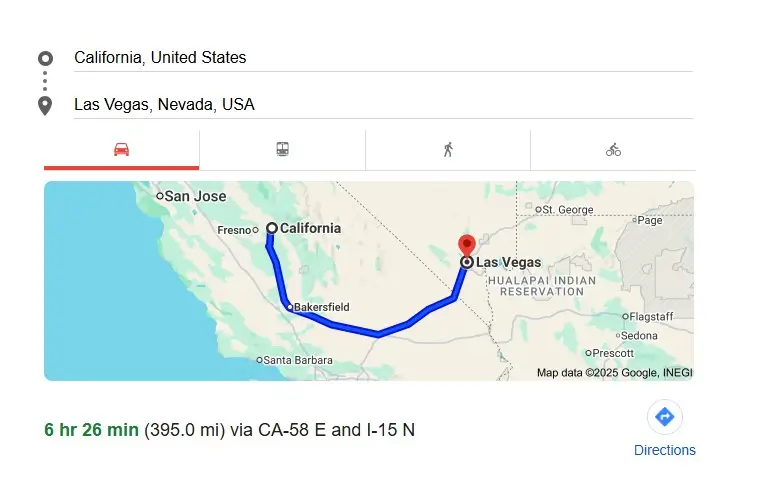
Image credit: Google Map
Driving from California to Las Vegas
Sure, flying is faster—but driving has its own perks, especially if you love the open road or plan on doing some sightseeing.
Here’s a breakdown of major driving routes:
- L.A. to Las Vegas: 270 miles, ~4–5 hours
- San Diego to Vegas: 330 miles, ~5–6 hours
- San Francisco to Vegas: 570 miles, ~8–9 hours
- Sacramento to Vegas: 560 miles, ~8 hours
Pros of driving:
- Flexibility in departure times
- Scenic stops along the way (Barstow, Mojave Desert)
- No baggage fees
Cons:
- Traffic on I-15 can be brutal—especially on Fridays and Sundays
- Gas prices + wear and tear on your car
Driving is great for groups or road trippers, but if time is tight, flying wins every time.
Taking a Bus or Train
If you’re budget-conscious and don’t mind longer travel times, buses and trains are another option:
Buses (Greyhound, FlixBus, Megabus):
- Cost: $20–$60
- Time: 5–10 hours depending on departure city
- Pros: Super cheap, frequent departures
- Cons: Long travel time, limited comfort
Amtrak Train:
- No direct train to Las Vegas, but you can ride partway and transfer via bus
- Example: L.A. to Needles (train) + Needles to Las Vegas (bus)
While not the most efficient way to travel, trains and buses work well for students, backpackers, or anyone traveling ultra-cheap.
Conclusion
Flying from California to Las Vegas is one of the easiest, quickest, and most popular domestic routes in the U.S.—and for good reason. Whether you’re jetting off for a bachelor party, a business conference, or just a change of scenery, getting to Vegas by plane is typically faster and often cheaper than you’d expect.
From major hubs like LAX and SFO to smaller airports like Burbank and Oakland, flights depart daily and frequently. Flight times vary slightly depending on your departure city, but generally range from 43 minutes to 1 hour and 35 minutes. With plenty of airline choices—budget or premium—you can tailor your trip to suit your schedule and wallet.
So next time you’re thinking about how far it is from California to Las Vegas by plane, remember: it’s not far at all. With the right timing and a little planning, Sin City is just a short hop away.
Frequently Asked Questions
Q1: How early should I arrive at the airport for a flight to Vegas?
A: Arrive at least 90 minutes before departure, especially at busy airports like LAX or SFO. TSA lines can be unpredictable.
Q2: Do I need a passport or ID to fly from California to Las Vegas?
A: You don’t need a passport (it’s a domestic flight), but you do need a valid government-issued photo ID, like a driver’s license. Real ID is now required for most travelers.
Q3: Are there direct flights to Las Vegas from smaller California cities?
A: Yes! Cities like Burbank, Oakland, Santa Ana, and Fresno often have direct flights, especially with airlines like Southwest or Allegiant.
Q4: Is it cheaper to fly round-trip or one-way?
A: Round-trip is usually cheaper. However, one-way deals do pop up on budget airlines—especially during mid-week.
Q5: Can I bring a carry-on for free on these short flights?
A: It depends on the airline. Southwest includes two free bags. Spirit and Frontier charge for everything—even carry-ons. Always check before booking.

